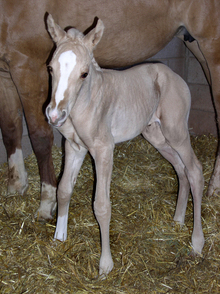Diarrhea is one of the most common problems of newborn foals. Diarrhea can be a primary problem or secondary to sepsis.

Mare - A source of infectious diarrhea in foal
Frequency of the diarrhea, suckling activity of the foal, and whether or not any other foals are affected on the premises are all very pertinent questions related to the cause of foal diarrhea.<
Searching for a specific pathogen in the feces of these foals is often unrewarding. Taking a thorough history is important to rule in/out age linked causes of diarrhea such as foal heat diarrhea, as well as to rule out other less common causes such as sand ingestion.
Frequency of the diarrhea, suckling activity of the foal, and whether or not any other foals are affected on the premises are all very pertinent questions. Complications of diarrhea include severe dehydration, metabolic acidosis, electrolyte derangements, hypoproteinemia and bacteremia.
Noninfectious diarrhea in foals
Foal heat diarrhea is so named due to its occurrence during the first heat cycle post-partum (5-15 days). One study suggests that the cause of foal heat diarrhea is inoculation of microflora and maturational changes of the gastrointestinal tract.
Foals typically do not demonstrate the signs of systemic illness observed with infectious causes. They are usually bright, alert and suckling with normal vigor. Nutritional causes of diarrhea in neonates are infrequent, with excessive milk intake that may occur when feeding orphaned foals and consumption of sand occurring most commonly.
Asphyxia related gut injury (also called neonatal gastroenteropathy) can occur with severe oxygen deprivation at birth. Affected foals typically display other signs of neonatal encephalopathy and develop ileus. Miscellaneous causes of noninfectious diarrhea include gastric ulceration, ingestion of sand and irritants.
Digital examination of the rectum may reveal sandy material in foals that have consumed excessive quantities of sand. Abdominal radiographs can confirm the presence of sand. Treatment for sand includes small amounts of mineral oil and psyllium via nasogastric tube.
Infectious diarrhea in the foal
Up to 50% of diarrhia in foals less than 30 days of age are bacteria related, according to research. Diarrhea is often one of the primary presenting complaints for septic foals. The most common specific aerobic intestinal pathogen is Salmonella. Although outbreaks of Salmonellosis are possible in horses of any age, most occurrences in foals are isolated cases.
Mares appear to be the primary source of infection and are often positive for fecal shedding when their foals are diagnosed with salmonellosis even though they rarely have clinical signs of disease. Most affected foals have moderate to severe clinical signs that include fever, diarrhea, dehydration, profound depression and reduced appetite.
Diarrhea can vary in both consistency and volume, and may contain blood. Colic is common in the early stages of the disease.
If salmonella is the cause of the disease, fecal shedding may persist for days to weeks and can pose a risk to other animals or humans. Enteric salmonellosis is characterized by acute colitis and foals may suffer from cardiovascular shock. Fever, abdominal pain, and abdominal distention may be present, as well as other noted symptoms. Ongoing assessment and treatment by a veterinarian is crucial for returning the foal to a condition of good health.
Read more about Diarrhea
